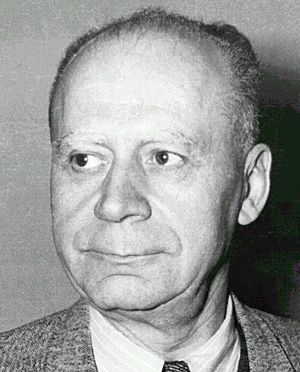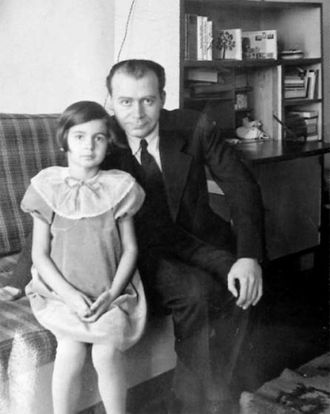Lucian Blaga facts for kids
Quick facts for kids
Lucian Blaga
|
|
|---|---|

Blaga's portrait, Museum of the Romanian Peasant
|
|
| Born | 9 May 1895 |
| Died | 6 May 1961 (aged 65) |
| Resting place | Lancrăm, Sebeș Municipality, Alba County, Romania |
| Alma mater | University of Vienna |
| Occupation | linguist, poet, translator, philosopher, writer, journalist, diplomat |
|
Notable work
|
Poems of light |
| Political party | National Christian Party |
| Movement | |
| Spouse(s) | Cornelia Brediceanu |
| Children | Ionel Blaga, Dorli Blaga |
| Parents |
|
| Awards | Hamagiu Award (1935) |
Lucian Blaga ( 9 May 1895 – 6 May 1961) was a Romanian philosopher, poet, playwright, poetry translator and novelist.
Contents
Biography
Lucian Blaga was a commanding personality of the Romanian culture of the interbellum period and in spirit - for his refusing to refuse to the normal values of Christian Idealist Romanian Philosophy at all cost, through his ressistence regarding obsessive decade - 50s - Communism through Romanian and Occident culture - in all postwar era influencing the circle poets, Nicolae Labiș and the 60s, or the religious poetry of The Burning Bush of Mother Maria up to contemporary times, - important Jewish names like Steinhardt or bornagain poetry, orthodox or Pentecostal, in the Commune Age - in all being a very valued author in his country, The National Theater of Cluj being named NT Lucian Blaga of Cluj, and from 1998 the Romanian state put Blaga on a 5000 Lei banknote, and since 2006, the current 200 Lei. He was a philosopher and writer highly acclaimed for his originality, a university professor and a diplomat. He was born on 9 May 1895 in Lámkerék (now Lancrăm), near Gyulafehérvár (now Alba Iulia), Kingdom of Hungary, Austria-Hungary, his father being an Orthodox priest. He later described his early childhood, in the autobiographical The Chronicle and the Song of Ages, as "under the sign of the incredible absence of the word".
His elementary education was in Hungarian at Szászsebes (now Sebeș) (1902–1906), after which he attended the "Andrei Șaguna" Highschool in Brassó (now Brașov) (1906–1914), under the supervision of a relative, Iosif Blaga (Lucian's father had died when the former was 13), who was the author of the first Romanian treatise on the theory of drama. At the outbreak of the First World War, he began theological studies at Nagyszeben (now Sibiu), where he graduated in 1917. He published his first philosophy article on the Bergson theory of subjective time. From 1917 to 1920, he attended courses at the University of Vienna, where he studied philosophy and obtained his PhD.
Upon returning to Transylvania, now a part of Romania, he contributed to the Romanian press, being the editor of the magazines Culture in Cluj and The Banat in Lugoj.
In 1926, he became involved in Romanian diplomacy, occupying successive posts at Romania's legations in Warsaw, Prague, Lisbon, Bern and Vienna. His political protector was the famous poet Octavian Goga, who was briefly a prime minister; Blaga was a relative of his wife. He was elected a titular member of the Romanian Academy in 1936. His acceptance speech was entitled Elogiul satului românesc (In Praise of the Romanian Village).
In 1939, he became professor of cultural philosophy at the University of Cluj, temporarily located in Sibiu in the years following the Second Vienna Award. During his stay in Sibiu, he edited, beginning in 1943, the annual magazine Saeculum.
He was dismissed from his university professor chair in 1948 because he refused to express his support to the new Communist regime and he worked as librarian for the Cluj branch of the History Institute of the Romanian Academy. He was forbidden to publish new books, and until 1960 he was allowed to publish only translations. He completed the translation of Faust, the masterpiece of Goethe, one of the German writers that influenced him most.
In 1956, he was nominated to the Nobel Prize for Literature on the proposal of Bazil Munteanu of France and Rosa del Conte of Italy, but it seems the idea was Mircea Eliade's. Still, the Romanian Communist government sent two emissaries to Sweden to protest against the nomination, because Blaga was considered an idealist philosopher, and his poems were forbidden until 1962. There are strong cultural indices to conclude that the novel Pasternak Boris published in Italy in 1957 and Rejected to Nobel in 1958 by PCUS was about Blaga, not Pasternak, living the Second Revolution in Romania of 1944+1948, and also it is that the fleuve novel The most loved of the earthbeings, 1980, by Marin Preda - that brought him sudden death the same year after publication and book withdrawal - was not only about the time in prison of poet Ion Caraion but on the European stature of Lucian Blaga. Out of Lucian Blaga innumerable pedologic realisations, the Byzantine Romanian man of culture of a moderate nature, and a political detainee since 1959 to 1964, boyar Al. ”Conu Alecu” Paleologu is his most profound passing-torch.
He was diagnosed with cancer and died on 6 May 1961. He was buried on his birthday, 9 May, in the countryside village cemetery of Lancrăm, Romania.
He was married to Cornelia (née Brediceanu). They had a daughter, Dorli, her name being derived from dor, a noun that can be translated, roughly, as "longing".
The University of Sibiu bears his name today.
Literature
Poetry
- 1919 – Poems of Light (Poemele luminii)
- 1921 – The Prophet's Footsteps (Pașii profetului)
- 1924 – In the Great Passage (În marea trecere)
- 1929 – In Praise of Sleep (Laudă somnului)
- 1933 – At the Watershed (La cumpăna apelor)
- 1938 – At the Courtyard of Yearning (La curțile dorului)
- 1943 – Unsuspected Steps (Nebănuitele trepte)
- 1982 – 3 Posthumous Poems
Drama
- 1921 – Zamolxis, a Pagan Mystery
- 1923 – Whirling Waters
- 1925 – Daria, The Deed, Resurrection
- 1927 – Manole the Craftsman (Mesterul Manole)
- 1930 – The Children's Crusade
- 1934 – Avram Iancu
- 1944 – Noah's Ark
- 1964 – Anton Pann – published posthumously.
Philosophy
His philosophical work is grouped in four trilogies:
- Filosofia cunoașterii (gnoseology) (1943)
- Filosofia culturii (culture) (1944)
- Filosofia valorilor (values) (1946)
- Filosofia cosmologică (cosmology) (1983 posthumously)
The fourth work, Cosmologica, was completed but not published at the time because of communist regime censorship. Before death, Blaga left an editorial testament on how his works are to be published posthumously
The novel Charon's Ferry is intended to be a companion to the philosophical trilogies. In it Blaga addresses some of the more problematic philosophical issues such as those pertaining to political, (para)psychological or occult phenomena, under the name of a fictive philosopher (Leonte Pătrașcu).
Philosophical works
- 1924 - "The Philosophy of Style"
- 1925 - "The Original Phenomenon" and "The Facets of a Century"
- 1931 - "The Dogmatic Aeon"
- 1933 - "Luciferian Knowledge"
- 1934 - "Transcendental Censorship"
- 1936 – "Horizon and Style" and "The Mioritic Space"
- 1937 – "The Genesis of Metaphor and the Meaning of Culture"
- 1939 – "Art and Value"
- 1940 – "The Divine Differentials"
- 1942 – "Religion and Spirit" and "Science and Creation"
- 1943 – The Trilogy of Knowledge (The Dogmatic Aeon, Luciferian Knowledge, Transcendent Censorship; in 1983, On Philosophical Cognition and Experiment and the Mathematical Spirit was added posthumously according to his will)
- 1944 – The Trilogy of Culture (Horizon and Style, The Mioritic Space, The Genesis of Metaphor and the Meaning of Culture)
- 1946 – The Trilogy of Values (Science and Creation, Magical Thinking and Religion, Art and Value)
- 1959 – Historical Existence
- 1966 – Romanian Thought in Transylvania in the 18th Century
- 1968 – Horizons and Stages
- 1969 – Experiment and the Mathematical Spirit
- 1972 – Sources (essays, lectures, articles)
- 1974 – On Philosophical Cognition
- 1977 – Philosophical Essays
- 1983 – The Cosmological Trilogy (The Divine Differentials, Anthropological Aspects, Historical Existence)
Other works
- 1919 – Stones for My Temple, aphorisms
- 1945 – Discoblus, aphorisms
- 1965 – The Chronicle and Song of Ages, memoirs
- 1977 – The Élan of the Island, aphorisms
- 1990 – Charon's Ferry, novel
Presence in English language anthologies
- Born in Utopia - An anthology of Modern and Contemporary Romanian Poetry - Carmen Firan and Paul Doru Mugur (editors) with Edward Foster - Talisman House Publishers - 2006 - ISBN: 1-58498-050-8
- Testament – Anthology of Modern Romanian Verse / Testament - Antologie de Poezie Română Modernă – Bilingual Edition English & Romanian – Daniel Ioniță (editor and translator) with Eva Foster, Daniel Reynaud and Rochelle Bews – Minerva Publishing 2012 and 2015 (second edition) - ISBN: 978-973-21-1006-5
- Testament - Anthology of Romanian Verse - American Edition - monolingual English language edition - Daniel Ioniță (editor and principal translator) with Eva Foster, Daniel Reynaud and Rochelle Bews - Australian-Romanian Academy for Culture - 2017 - ISBN: 978-0-9953502-0-5
- Testament - 400 Years of Romanian Poetry - 400 de ani de poezie românească - bilingual edition - Daniel Ioniță (editor and principal translator) with Daniel Reynaud, Adriana Paul & Eva Foster - Editura Minerva, 2019 - ISBN: 978-973-21-1070-6\
- Romanian Poetry from its Origins to the Present - bilingual edition English/Romanian - Daniel Ioniță (editor and principal translator) with Daniel Reynaud, Adriana Paul and Eva Foster - Australian-Romanian Academy Publishing - 2020 - ISBN: 978-0-9953502-8-1 ; LCCN - 2020907831
See also
 In Spanish: Lucian Blaga para niños
In Spanish: Lucian Blaga para niños



